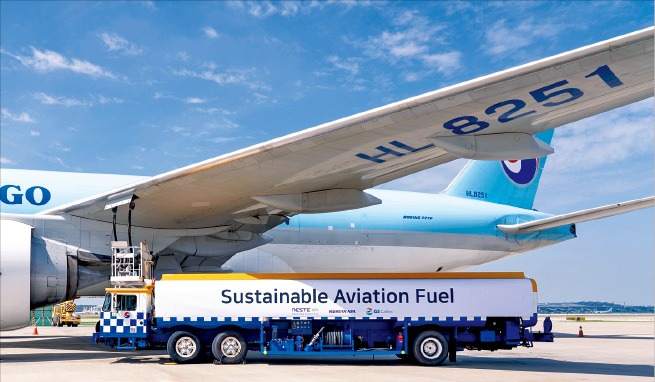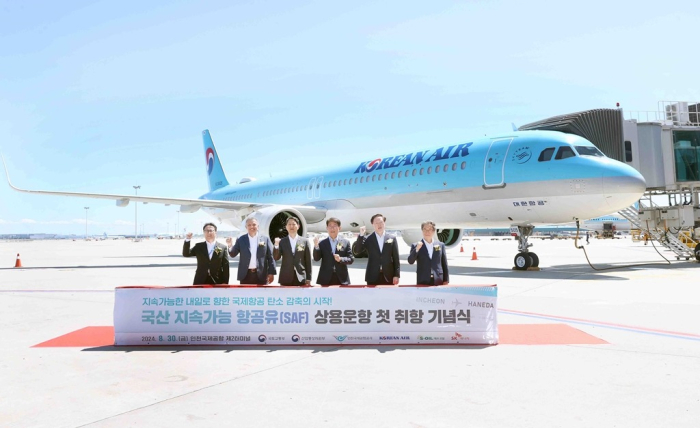Airlines
Korea’s airlines to use SAF starting from Japan routes
The country will support SAF production, supply, and technology development to maintain its status as the world’s top jet fuel exporter
By Aug 30, 2024 (Gmt+09:00)
4
Min read
Most Read
Samsung steps up AR race with advanced microdisplay for smart glasses


When in S. Korea, it’s a ritual: Foreigners make stops at CU, GS25, 7-Eleven


Maybe Happy Ending: A robot love story that rewrote Broadway playbook


NPS yet to schedule external manager selection; PE firms’ fundraising woes deepen


US auto parts tariffs take effect; Korea avoids heavy hit



South Korea’s airlines are set to use fuel mixed with sustainable aviation fuel (SAF) for international routes, starting from services to Japan, as the government plans to require all outbound flights to apply the eco-friendly fuel from 2027.
The Ministry of Land, Infrastructure and Transport and the Ministry of Trader, Industry and Energy said on Friday that six domestic airlines are scheduled to operate regular international flights using fuel blended with SAF supplied by refiners in the country.
Those carriers will use jet fuel that contains 1% SAF for one flight a week according to the ministries. The nation's top carrier, Korean Air Lines Co. has already used it and Asiana Airlines Inc. will roll it out in early September, to be followed by the low-cost carriers.
SAF is an alternative fuel made from non-petroleum feedstocks that reduces emissions from air transportation.
“It is not an option but a must to use SAF, a key for the global aviation car5bon reduction, to deal with the climate crisis and ensure the sustainable growth in the airline industry,” said Park Sangwoo, Minister of Land, Infrastructure and Transport, at the country’s main gateway Incheon International Airport.
WORLD’S 20TH COUNTRY TO USE SAF ON COMMERCIAL FLIGHTS
The move is set to list South Korea as the world’s 20th country on the list of nations using SAF for commercial flights complied by the International Civil Aviation Organization (ICAO), the ministries said.
South Korean airlines have yet to use the mixed fuel for passenger services although six demo flights using SAF on cargo operations were completed last year.
Korean Air kicked off the use of the mixed fuel on a flight Friday from Incheon International Airport to Haneda Airport in Tokyo.
“We plan to use SAF for long-distance flights as a global carrier leading the global aviation sector,” said a Korean Air official.
Its smaller rival Asiana Airlines is poised to use the fuel for the route from Sept. 7. Low-cost carriers are set to join the move. T'way Air Co. plans to supply the fuel for the flight from Incheon to Kumamoto, Japan, while Eastar Jet Co., Jeju Air Co. and Jin Air Co. are poised to use the fuel for their services to Kansai, Fukuoka and Kitakyushu, respectively, in the fourth quarter.

MANDATORY
South Korea’s jet fuel consumption rose 37.2% to a four-year high of 34.7 million barrels in 2023, according to the Korea National Oil Corp. (KNOC).
The government plans to require all international flights departing the country to use fuel containing 1% SAF from 2027 when participation in the Carbon Offsetting and Reduction Scheme for International Aviation (CORSIA) developed by the ICAO becomes mandatory. The CORSIA is a carbon offset and carbon reduction scheme to lower CO2 emissions for international flights and curb the aviation impact on climate change.
Other countries have already introduced similar regulations. The European Union required all flights from the bloc to mix 2% SAF in 2025.
The requirement of 1% SAF is expected to cut 160,000 tons of carbon emissions a year based on South Korean airline flights in 2023, the transportation ministry said. The emissions are similar to carbon effusions from 53,000 passenger vehicles in the country a year.
The nation plans measures to minimize the impact of SAF use since the cost of eco-friendly fuel is double or triple that of existing jet fuel.
The authorities may consider airlines’ fare increases on SAF use when distributing traffic rights and cut airport facility usage fees for carriers, which do not hike ticket prices much, among other steps.
TO SUPPORT SAF INDUSTRY
South Korea aims to support SAF production, supply and technology development to cement its role as the global top jet fuel exporter.
“It is essential to secure one-stop supply capabilities for both jet fuel and SAF to maintain and strengthen our competitiveness as the No. 1 aviation fuel exporter,” said Trade, Industry and Energy Minister Ahn Dukgeun.
The ministry plans to increase investment tax credits and offer incentives for investments in new SAF production facilities.
The authorities are set to ease regulations to allow the use of not only used cooking oil but also other materials for SAF production while jointly exploring overseas bioresources.
The country is also poised to support companies at home and abroad forming consortiums with the KNOC to secure raw materials in other countries.
Write to Yeong-Hyo Jeong and Jin-Won Kim at hugh@hankyung.com
Jongwoo Cheon edited this article.
More to Read
-

-

-
 AirlinesAsiana to introduce sustainable aviation fuel in partnership with Shell
AirlinesAsiana to introduce sustainable aviation fuel in partnership with ShellJan 30, 2023 (Gmt+09:00)
1 Min read
Comment 0
LOG IN


